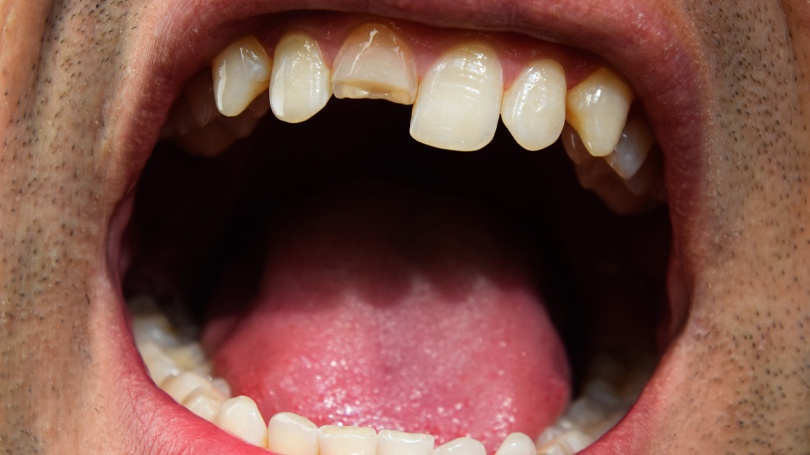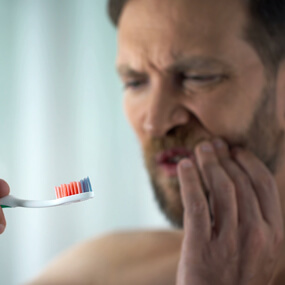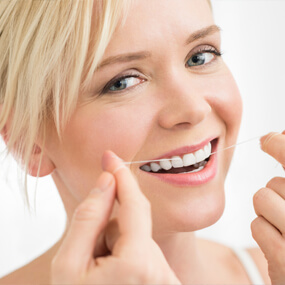Steps to Take When You Chip or Break a Tooth

Cracked, chipped, and broken teeth are among the most common dental injuries. The hockey player who loses his tooth has probably been there and done that. For the average person, this is likely his or her first such experience. It can be quite jarring—both literally and figuratively—and you may not know how to react. The first thing is to know the steps you can take to limit or even avoid any permanent damage.
Here are the essential steps to remember when you damage a tooth:
- If you lose the tooth whole, preserve it in milk, a saline solution, or water.
- Rinse your mouth out thoroughly with water.
- Apply pressure to stop any bleeding. If bleeding is profuse, call for emergency help.
- Take ibuprofen to relieve discomfort and reduce swelling.
- Use a cold compress for further relief.
- Schedule an appointment with a dentist as soon as possible.
Preserving a Tooth
If you have a tooth knocked out whole, your dentist may be able to save it. It is important to find that tooth as soon as possible. If you cannot because you have to attend to the bleeding, for instance, perhaps someone else can. Once the tooth is found, rinse it with water. Then, you should soak the tooth in a small container of milk. If milk is not available, use a saline solution or just water.
If the tooth is loosened but still attached to some degree, leave the tooth in the mouth. Attempting to remove it yourself can cause more damage and bleeding and increase the risk of infection. You can apply light pressure if needed. You should also avoid chewing anything before seeing a dentist.
Rinse Your Mouth
Right after your tooth is damaged, you want to rinse the mouth to remove blood, dirt, and any other foreign substances. If you have warm water available, use that since it will be more soothing. Cold water is fine if it is all that you have, but you may be sensitive to it. If there are any pieces of tooth in your mouth, rinsing and spitting out will get rid of those rather than you swallowing them.
Stop the Bleeding
Most dental injuries will not bleed profusely. If there is still bleeding after rinsing, apply pressure with fresh gauze—or use a fresh towel if you do not have gauze. You only need light pressure, and you should avoid scrubbing or otherwise irritating the area. This should stop the bleeding in most cases.
If it does not stop the bleeding, then you need emergency attention. Depending on the severity and your options, you should call 9-1-1 or have someone drive you to the closest emergency room. If the dental damage was due to a head injury, you should be examined for a concussion regardless.
Take a Pain Reliever
If you are experiencing pain, you can take an over-the-counter pain reliever. Ibuprofen is an excellent choice, as are aspirin and naproxen. These are non-steroidal anti-inflammatories, which means that they will reduce inflammation as well as help with the pain. Acetaminophen, on the other hand, can help to alleviate any pain but will not reduce inflammation in the affected area.
Apply a Cold Compress
A cold compress is a good way to get immediate relief, and using a compress will not only alleviate pain but reduce swelling. This is because the cold constricts the blood vessels and thus slows the flow of blood through that area. If you do not have a cold compress, it is fairly simple to make your own. Fill a Ziplock bag with ice and wrap it in a towel. Replace the ice as needed.
See Your Dentist
Ideally, you should see your dentist within a half hour of the injury occurring. Even if there is no pain, never presume that you are all right. There can be fundamental damage that causes you to lose the tooth. Something as seemingly minor as a hairline fracture can open the door to infection.
Have someone call your dentist and alert them that you are on your way and have a dental emergency. Even if you do not have your own dentist, most dentists will accept you if it at all possible. If it is after hours and your dentist has an emergency number, call it. He or she will advise you on how to proceed. Some areas have dental care centers that are open on weekends, at night, and even around the clock. As a last resort, you can also go to an urgent care center or an emergency room.
Letting your dentist know you are coming is important if at all possible. It gives your dentist an idea of the challenge, and he or she can use your transit time to prepare. If you have the tooth in a container soaking in milk, be sure to bring that with you in case your dentist can restore it.
Act Fast When You Chip or Break a Tooth
If you chip or otherwise break your tooth, following the steps explained above can make a big difference in how much pain you experience and how much permanent damage has to be fixed. Jeffrey D. Clark, DDS, and his entire team at Scottsdale Cosmetic Dentistry Excellence strive to treat all dental emergencies as soon as possible. Call us at 480 585 1853, and we’ll work to get you treated fast. If you have a dental problem that requires less immediate attention, we will schedule an appointment at a time convenient to you.




